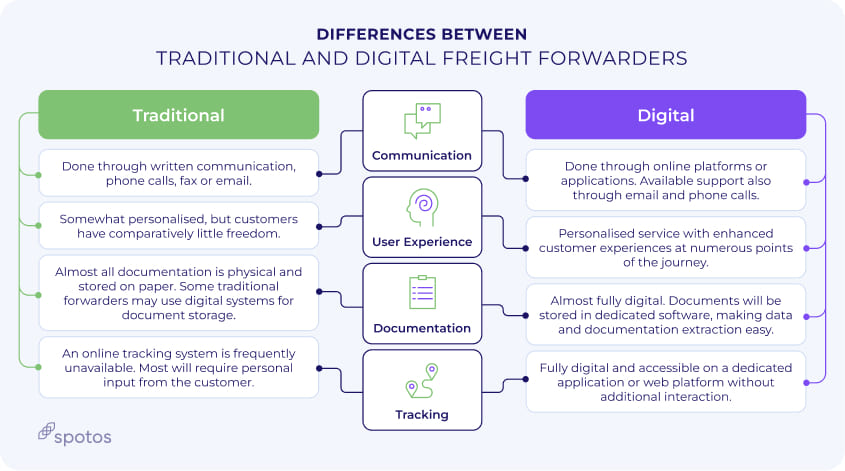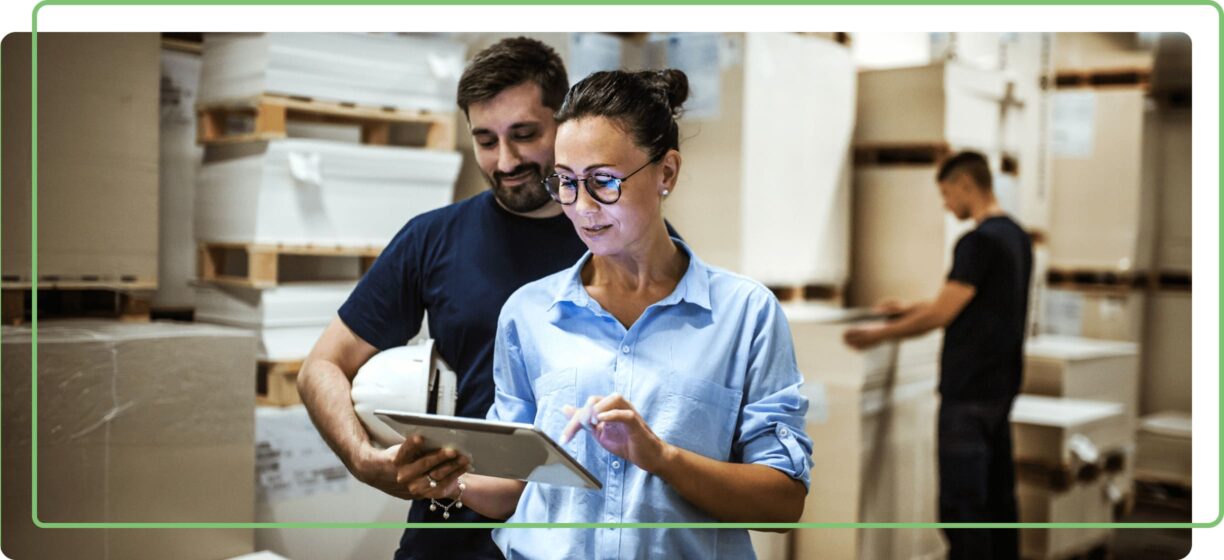Traditional freight forwarders have been around for the longest time. However, digital transformations aren’t as common as in other sectors, with the logistics industry slow to revolutionise.
However, these trends are changing as digital freight forwarders become a more popular option among shipping companies. Ease of access, a greater selection of carriers, and a fully digitised service are some benefits digital freight forwarding companies provide.
Yet, many shipping companies haven’t made the transition to digital platforms. While there are reasons to stick with traditional freight forwarders, digital should be the next step for the logistics industry.
What is a traditional freight forwarder?
Traditional freight forwarders rely (almost) exclusively on written and audio (i.e., phone calls) communication as their main way of doing business. Consequently, they do not own any platform outside of a business website.
In other words, hiring a traditional freight forwarder means sending an email or making a phone call to the company. Then, usually meet with the stakeholders, sign paper agreements, and do business through these mediums.
Since there is no communication, file sharing, and documentation platform, the freight forwarder and their customers rely on various written agreements and continue phone calls with carriers to negotiate rates, prepare documentation, and keep up with any changes during deliveries.
Like all freight forwarders, however, they will still take care of shipments and distribution. They might be a bit slower than digital freight forwarders, but taking care of the entire shipping process and, in turn, the customer is still the foundation of the business.
Finally, tracking systems may be lacking in traditional freight forwarders. While many have integrated digital systems to ensure proper cargo tracking, some old-school companies still don’t have this feature.
What are digital freight forwarders?
A digital freight forwarder is a company with a platform where users can manage the entire process without involving a third party. These platforms may be marketplaces, websites, or applications.
While a digital freight forwarder will still allow customers to contact them through customer support, whether by email or phone call, the primary method of communication is performed through their platform; digital freight forwarding companies, however, give a lot more power to the customer as they have full control over the entire process.
Additionally, most digital freight forwarders will provide more services as they access more data. Digital platforms allow them to use big data to assess rates and carriers and provide insights into shipping efficiency.
Other advantages digital technologies have:
- In-depth cargo tracking
- Artificial intelligence
- In-built invoicing
- Documentation management
Companies that go with a digital freight forwarder will be able to reduce paperwork while receiving the same or even a higher level of quality throughout the shipping process.
Finally, it should be noted that previously a software platform wasn’t as popular, even if the company was a digital freight forwarder. Since, however, even traditional freight forwarders have adopted digital capabilities, an online platform is considered the cutting-edge innovation in the industry.
Differences between traditional and digital freight forwarders
While both companies revolve around the same services as they are involved in the logistics industry, some aspects necessarily differ. A traditional freight forwarder can perform some things better, while others will be done better digitally. See the vital differences between the two in the following image.
Traditional Freight Forwarder
- It is mostly done through written communication, phone calls, and, potentially, fax or email
- Somewhat personalised, but customers have comparatively little freedom
- Almost all documentation is physical and stored on paper. Some traditional forwarders may use digital systems for document storage
- An online tracking system is frequently unavailable. Most will require personal input from the customer
Digital Freight Forwarder
- It is done through online platforms or applications. Additional support is available through email and phone calls
- Personalised service with enhanced customer experiences at numerous points of the journey
- Almost fully digital. Most documents will be stored in dedicated software, making data and documentation extraction easy
- Fully digital and accessible by the customer on a dedicated application or web platform without additional interaction
Differences Between Traditional and Digital Freight Forwarders

Benefits of digital freight forwarders
Digital freight forwarders have a lot of unique benefits for those willing to learn the ropes of online platforms. A slight learning curve is involved, but the power provided by data and complete management is immense.
Faster quoting process
Digital forwarders often have implemented partial or complete quotation automation. As a result, their customers can visit the associated website or application, browse the available carriers, and instantly get recommendations and rates.
Contrasted with traditional freight forwarding businesses, digital ones make the selection process much quicker, which allows companies to focus more on shipping goods instead of finding a good partner.
Analytics
Digital freight forwarding companies will have inbuilt data tracking and analytics services into their platforms. Businesses with dedicated teams can collect all data acquired from shipping and optimise internal practices.
Automation
Some digital forwarders will have APIs that allow developers to send automated messages to an endpoint. In other words, with some developers, shipping companies can completely automate carrier selection, payments, and many other processes.
Reduced paperwork
A digital transformation means moving away from paper. Instead, most documentation is uploaded to the cloud or other services, making it accessible immediately. So, the benefits of digital forwarders are two-fold – reduced paperwork and easier access to important documentation.
Reasons to use Spotos as your digital freight forwarder
Spotos is a digital freight forwarding company that provides the most extensive logistics services. Our digital platform will give you complete freedom over the shipment and tremendous net benefits.
Manage all supply chains in one spot
Spotos marketplace is home to many carriers and shippers that are extensively vetted by our teams to ensure that they can provide the highest quality services. Find companies to ensure your goods go from manufacturer to consumer without leaving our website.
Reduce costs
Our proprietary algorithm automatically suggests the best rates for your business needs. As a result, you will find the most cost-effective option for each shipment without requiring you to go through enormous troves of data and lists of carriers.
Additionally, due to numerous automation inbuilt into the Spotos platform, you can lower costs internally by reducing the time it takes to find suitable partners for your business.
Reduce unnecessary management
Spotos automatically ensures high-value cargo and guarantees the safe delivery of goods. Even if something happens to the shipment, Spotos teams will handle all insurance claims and settle disputes. Additionally, all payments are collected and distributed automatically, reducing manual work on your end.
Frequently Asked Questions
Getting started with digital freight forwarding is quite easy. Most companies, like Spotos, will have an online platform where you can simply register and go through the verification process.
Digital freight shipping is managing the delivery of goods through web platforms or applications. Most often, it is done through digital freight forwarding companies.
Digital freight matching matches carrier capacity with shipper loads through web platforms or applications. Digital freight matching is sometimes also called digital load matching.
Digital freight matching is often done through a platform or website with data on shippers and carriers. Most often, these will be digital freight forwarding companies with platforms where both shippers and carriers are registered.
